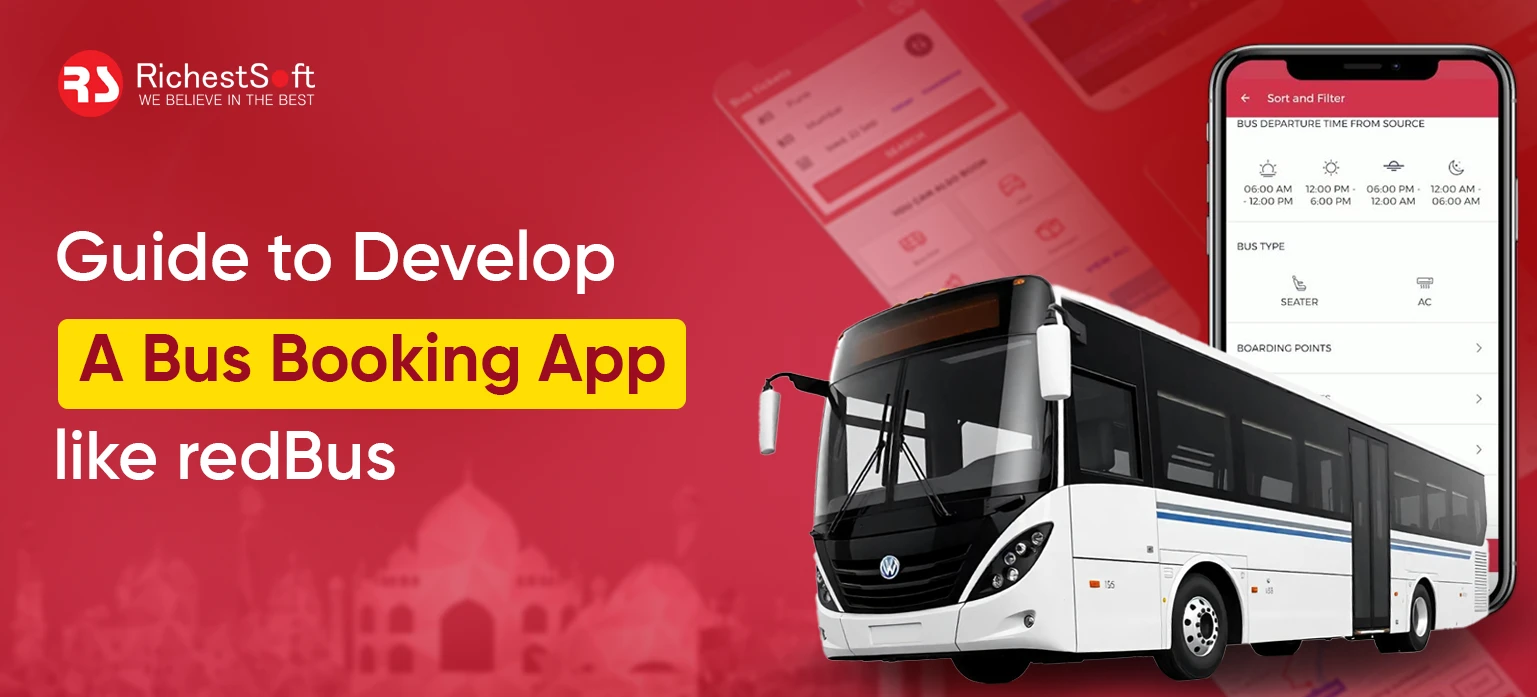August 29, 2025
Traveling by bus has always been one of the most convenient and budget-friendly modes of transportation. However, with the rise of digital solutions, the way people book bus tickets has completely transformed. Bus ticket booking apps like redBus have made it possible for passengers to book seats instantly, compare prices, track buses in real time, and enjoy a seamless travel experience. Moreover, with the extensive audience reach, such platforms have caught the attention of business enthusiasts eager to invest in travel-tech solutions.
No wonder the increasing utilization of redBus demonstrates how a straightforward idea can evolve into a global brand trusted by millions. But the question is- why only redBus? Well, among a crowded marketplace filled with alternatives, redBus continues to stand out through consistent service and customer trust. Its ability to align features with real passenger needs, combined with operational reliability, has helped the platform retain its leadership.
Consequently, for entrepreneurs and investors alike, redBus represents a proven business model that sparks new opportunities. So, are you inspired by its success and considering developing a similar platform? If yes, this guide will take you step by step through building a Bus Ticket Booking App like redBus.
An Overview of redBus
redBus has emerged as a dominant business in the online bus ticketing industry, bridging millions of passengers with operators across diverse routes. This platform offers real-time booking, secure digital payments, and flexible travel options, redefining the passenger journey. Yet, beyond convenience for users, redBus illustrates a powerful business opportunity. Its adaptive business model demonstrates how technology and a strong consumer base can create scalable growth, attracting enthusiasts to invest in white-label redBus-like apps. So if you are also among those inspired enthusiasts, then explore these business models:
Commission-Driven Revenue
redBus primarily thrives on commissions charged per booking from partnered operators. As more operators list their services, the revenue multiplies proportionally. This model delivers a predictable, recurring income stream, making commissions the cornerstone of its financial strength and scalability in diverse markets.
Advertising Partnerships
With its vast user traffic, redBus offers strategic advertising space to travel brands, insurers, and hospitality businesses. These ads generate supplementary revenue while allowing advertisers to access a highly targeted audience. This ecosystem benefits both redBus and advertisers without disrupting user experience.
Demand-Based Pricing
Dynamic pricing plays a pivotal role during peak travel seasons. Ticket prices fluctuate based on demand, enabling operators to maximize yield while customers still access flexible choices. This creates a win-win model where both profitability and consumer interest remain balanced.
White-Label Technology
redBus extends its technology to bus operators through white-label platforms, enabling them to host branded booking systems. Operators gain digital solutions without heavy investments, while redBus earns B2B revenue. This fosters deeper partnerships and diversifies revenue channels beyond traditional ticketing commissions.
Steps to Develop a Bus Ticket Booking App like redBus

Building a clone may sound easy, but without a clear vision, businesses easily overspend or overlook critical features. From strategy to execution, every stage demands precision to compete in today’s fast-evolving digital travel market. To help enthusiasts avoid common pitfalls and craft scalable solutions, here are key steps to create a strong, profitable foundation:
Market Research
Before starting development, conduct a thorough analysis of customer behaviors, operator expectations, and competitor strategies. Understanding user preferences for ticket availability, payment flexibility, and cancellation policies ensures the app addresses real needs.
This research also identifies gaps in current offerings, helping you differentiate your platform. A solid foundation reduces unnecessary costs, informs feature prioritization, and positions your app for sustainable revenue growth while aligning with long-term market demand.
Make a Platform Choice
Deciding whether to launch your app on iOS, Android, web, or as a cross-platform solution significantly impacts development, reach, and user engagement. Each platform has unique advantages, from market penetration to device compatibility, and influences your long-term scalability and maintenance requirements.
A well-informed platform choice ensures optimal performance, broad user accessibility, and cost-effective deployment. Evaluating your target audience’s device preferences and usage patterns helps create a seamless, widely adopted booking experience.
Choose the Right Business Model
Selecting the appropriate business model defines how your Bus Ticket Booking App like redBus, generates revenue and scales sustainably. Options include commission-based fees from operators, subscription plans, dynamic pricing, or cross-selling related travel services.
A carefully chosen model aligns with market demand, ensures predictable cash flow, and builds operator and user trust. Clear monetization strategies help entrepreneurs plan investments, optimize returns, and create a competitive advantage in the travel-tech industry.
Defining Core Features & User Experience
A successful app thrives on simplicity and intuitive navigation. Define must-have features such as seat selection, live tracking, and secure payments. But don’t stop there, enhance user experience with personalized notifications and loyalty rewards.
Operators should also enjoy a smooth backend for managing schedules and inventory. By balancing user convenience with operator control, you create an ecosystem that keeps both sides engaged and satisfied.
Designing Scalable UI/UX & Branding
Beyond utility, your app must connect emotionally with travelers. A clean interface with easy search options, quick booking flow, and secure login creates trust. Therefore, build a visually appealing design with quick search, seamless booking, and secure login features. A polished design fosters user trust and improves satisfaction during the booking journey.
Incorporate branding elements such as logos, colors, and subtle animations to differentiate your platform in a competitive market. Scalable design ensures the app functions well across devices while encouraging repeat usage and long-term loyalty from both passengers and operators.
Testing, & Quality Assurance
Once your vision strategy is finalized, begin development with structured processes. Agile methods support iterative progress, while thorough QA ensures stable, bug-free performance. Also, after development, start performing testing, which covers functionality, high-traffic stress scenarios, transaction security, and usability of the platform across diverse users. Delivering a flawless app from launch builds confidence among users and partners, establishes trust, and positions your platform as reliable and professional from day one.
Marketing, Launch, & Continuous Support
After development, ensure a smooth launch by monitoring performance, addressing any technical issues, and guiding users through initial interactions. Maintain continuous support through timely updates, bug fixes, and responsiveness to user feedback, ensuring the app remains stable and reliable.
This consistent attention builds user trust, encourages repeat engagement, and sustains long-term satisfaction, allowing your platform to grow steadily while maintaining high operational standards in the competitive travel-tech market.
Cost to Develop a Bus Ticket Booking App like redBus
If you want to know the exact development cost in advance, you need to understand your overall business vision and develop a strategy based on the project scope, desired features, and long-term business goals. A precise cost projection is essential to align development efforts with financial planning. Early-stage budgeting allows businesses to prioritize core functionalities, avoid overspending, and prepare for future scalability. Without a clear budget strategy, even well-conceived apps may face delays, resource misallocation, or compromises on quality and performance.
Typically, the cost to develop a Bus Ticket Booking App like redBus ranges between $30,000 – $250,000 or more, depending on the complexity of features, platform choice, and integration requirements. A basic app with essential booking and payment functions can range within a lower budget; however, advanced apps with real-time seat tracking, dynamic pricing, and multi-operator integration push costs higher. Explore the points mentioned below to know more about factors influencing the cost to develop a Bus Ticket Booking App like redBus:
Scope of Features & Functionalities
The wider the feature list, the higher the investment. Basic apps cover search, booking, and payments, while advanced platforms require GPS tracking, loyalty programs, and multi-language support. Adding innovative functions raises costs but significantly strengthens customer engagement and retention.
App Design & User Experience
Design isn’t just visual appeal; it shapes trust and usability. Custom UI/UX, responsive layouts, and intuitive navigation require skilled designers, adding to costs. However, a polished experience encourages repeat bookings and builds brand identity, making the investment worthwhile.
Backend Infrastructure & Scalability
Strong backend systems support heavy traffic during festive seasons or peak travel hours. Building for scalability demands higher upfront costs but prevents outages and downtime later. A reliable backend guarantees smooth operations and steady growth, particularly for expansion-focused startups.
Development Team Expertise
Cost varies depending on whether you hire freelancers, in-house developers, or a professional app development agency. Experienced teams charge more, but they deliver higher quality work compared to low-cost alternatives that often compromise performance.
Third-Party Integrations
Integrating APIs for payment gateways, seat layouts, GPS tracking, or chat support brings added functionality but increases costs. Each integration requires licensing or service fees, making it an important factor in the overall development budget.
Post-Launch Support and Maintenance
Launching the app is just the beginning. Regular updates, bug fixes, and security patches are ongoing expenses. A well-planned maintenance budget ensures the app stays relevant, secure, and competitive in the long run.
Conclusion
The bus booking industry continues to expand as digital travel becomes the preferred choice for millions worldwide. Building a platform like redBus isn’t just about creating an app; it’s about tapping into a proven business model that drives revenue through convenience, trust, and scale. With the right approach, investors can transform this idea into a sustainable growth engine.
Choosing the right development partner is equally vital. At RichestSoft, we bring expertise in strategy, design, and technology to craft high-performing bus booking apps tailored to your vision. From feature planning to post-launch support, we simplify the journey while ensuring long-term scalability.
 +1 315 210 4488
+1 315 210 4488 +91 99888 06489
+91 99888 06489








